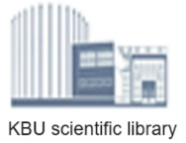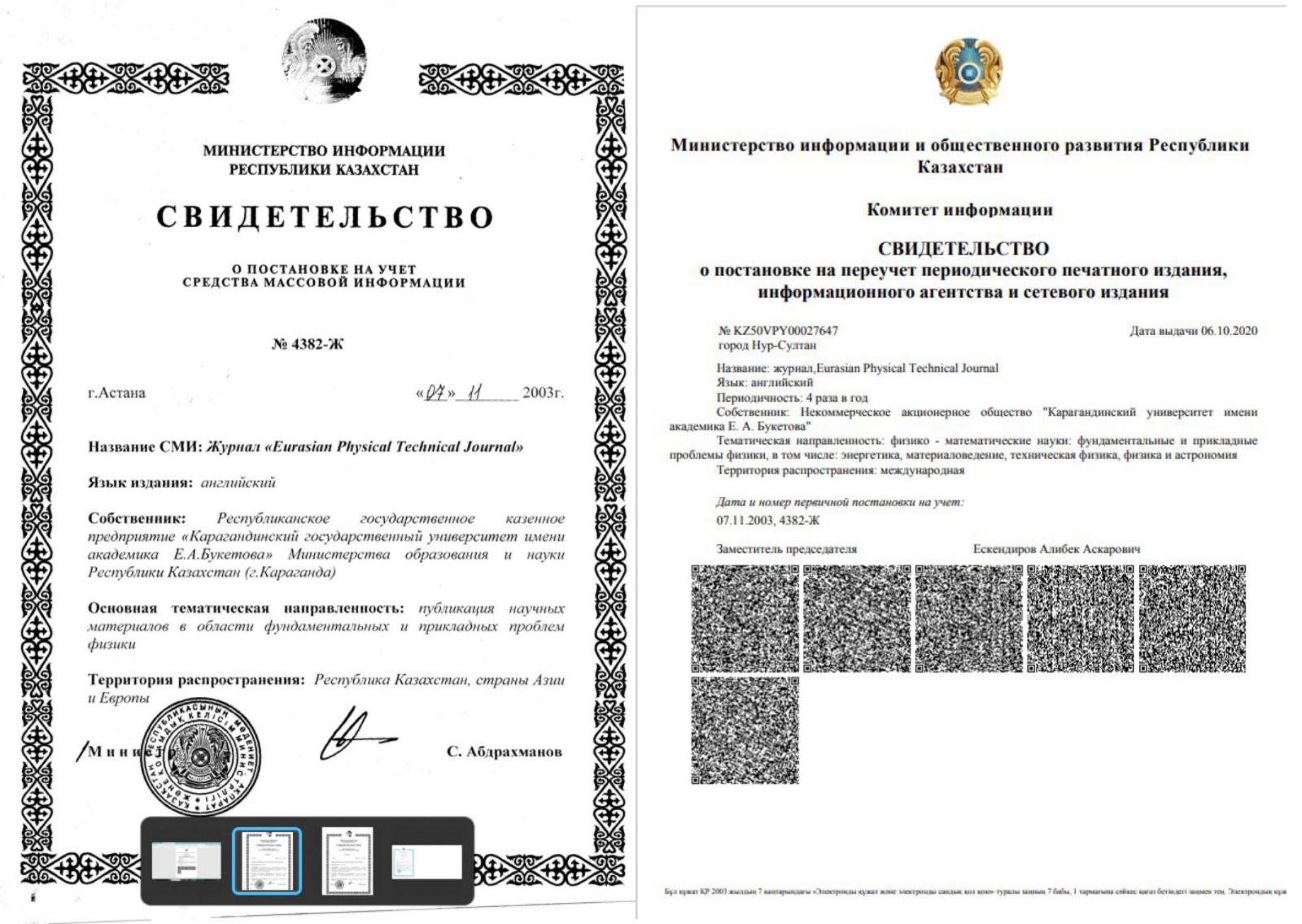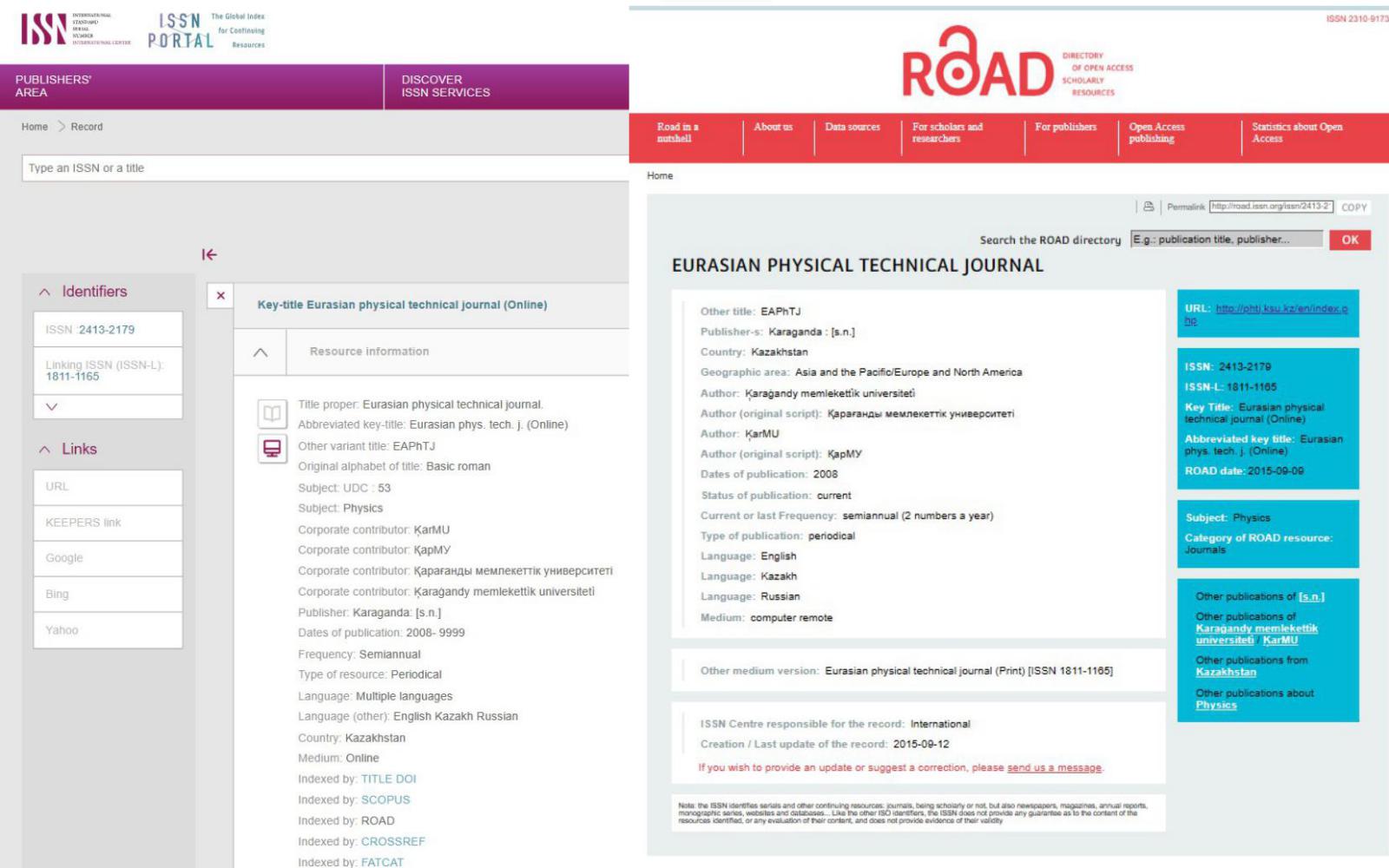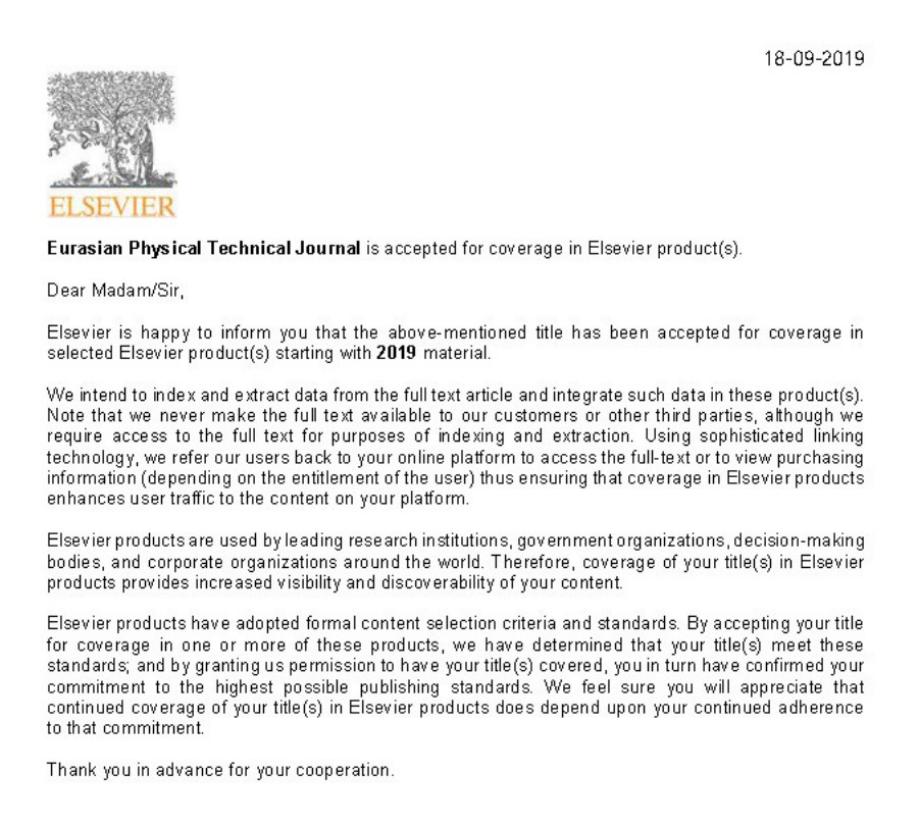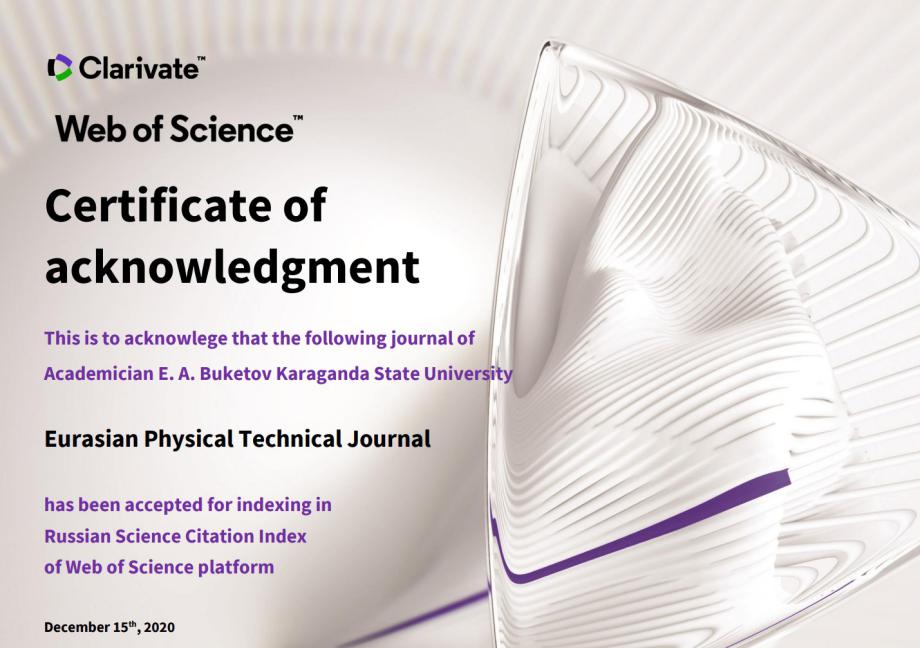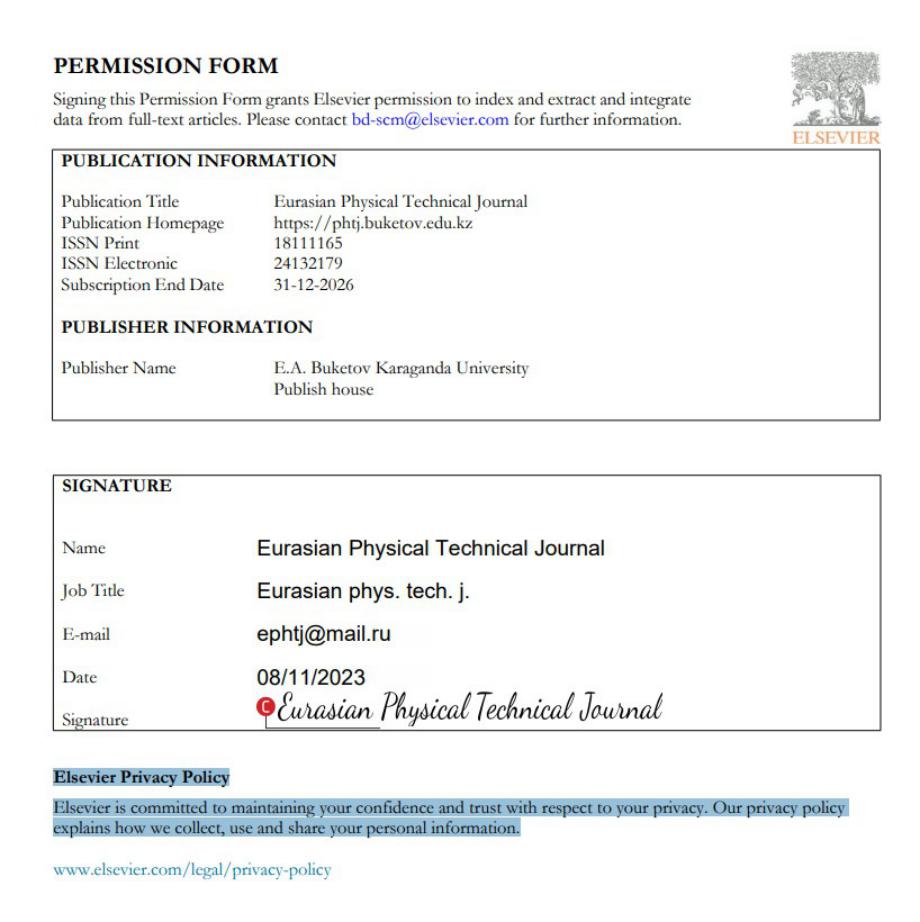Құйынды ток әдісін қолдануымен жұқа қабықшалардың өткізгіштігін автоматтандырылған бақылау
DOI:
https://doi.org/10.31489/2024no1/74-83Кілт сөздер:
құйынды ток түрлендіргіші, электр өткізгіштік, жұқа қабықшалар, мыс, бұзбайтын бақылауАңдатпа
Мақалада жұқа металл қабықшалардың электр өткізгіштігін өлшеу есептері үшін бұзбайтын бақылаудың құйынды ток әдісін қолдану мүмкіндігі қарастырылған. Өлшеу объектісі ретінде вакуумдағы газ фазасынан тұндыру әдісімен алынған әртүрлі қалыңдықтағы мыс қабықшалары қолданылды. Қазіргі заманғы өнеркәсіп пен ғылымда мыс қабықшаларын қолданудың өзекті бағыттарына шолу жасалып, жұқа мыс қабықшаларын зерттеуге жарамды бұзбайтын бақылаудың өзекті әдістеріне талдау жасалды. Қабықшаның электр өткізгіштігін өлшеуге арналған бүрку әдісі мен бағдарламалық-аппараттық кешеннің қысқаша сипаттамасы берілген. Қабықшаның электр өткізгіштік мәндерін құйынды ток түрлендіргішінің дабылы мәні бойынша қалпына келтіруге мүмкіндік беретін калибрлеу қисығы келтірілген. Калибрлеу қисығын құру үшін GaAs галлий арсенидінің үлгілері алынды. Бұл шешім берілген химиялық қосылыстың электр өткізгіштік мәндерінің алынған жұқа қабықшалардың есептелген көрсеткіштеріне жақындығымен түсіндіріледі, әртүрлі сипаттамалары бар қабықшаларды сынау нәтижелері ұсынылған және партияға байланысты қабықшалардың электр өткізгіштігінің таралуы көрсетілген. Жұқа қабықшаларды практикалық өлшеу сериясы бүркуге ұшыраған бастапқы заттың массасы мен алынған қабықшалардың сипаттамалары арасындағы байланыстың бар екендігін көрсетті. Электр өткізгіштігінің әртүрлі мәндері бойынша бір партия шеңберінде әртүрлі қабықшаларды бүрку сапасының айырмашылығы туралы қорытынды жасалды.
References
Sophian A., Tian G.Y. Electromagnetic and eddy current NDT: A review. Insight, 2001, Vol. 43, pp. 302–306. https://www.researchgate.net/publication/282684852_Electromagnetic_and_eddy_current_NDT_A_review
Auld B.A., Moulder J.C. Review of Advances in Quantitative Eddy Current Nondestructive Evaluation. J. Nondestruct. Eval., 1999, Vol. 18, pp. 3–36. https://doi.org/10.1023/A:1021898520626
Garcia-Martin J., Gomez-Gil J., Vazquez-Sanchez E. Non-Destructive Techniques Based on Eddy Current Testing. Sens., 2011, Vol. 11, pp. 2525–2565. https://doi.org/10.3390/s110302525
Lee H., Jane E., Kevin M. Low Frequency Eddy Current Testing of Insulators and Composites. J. of Nondestr. Eval., 2018, Vol. 37, pp. 58-70. https://doi.org/10.1007/s10921-018-0513-1
Mizukami K., Mizutani Y., Kimura K., Sato A. Visualization and size estimation of fiber waviness in multidirectional CFRP laminates using eddy current imaging. Compos. Part A., 2016, Vol. 90, pp. 261–70. https://doi.org/10.1016/j.compositesa.2016.07.008
Gao B., Lu P., Woo W. L., Tian G. Y., Zhu Y., Johnston M. Variational Bayesian subgroup adaptive sparse component extraction for diagnostic imaging system. IEEE Trans. Ind. Electron, 2018, Vol. 65, No 10, pp. 8142–8152. https://doi.org/10.1109/TIE.2018.2801809
Abidin I. Z., Tian G. Y., Wilson J., Yang S., Almond D. Quantitative evaluation of angular defects by pulsed eddy current thermography. NDT E Int., 2010, Vol. 43, No 7., pp. 537–546. http://dx.doi.org/10.1016/j.ndteint.2010.05.010
Cheng L., Tian G. Y. Surface crack detection for carbon fiber reinforced plastic (CFRP) materials using pulsed eddy current thermography. IEEE Sensors J., 2011, Vol. 11, No 12, pp. 3261-3268. https://doi.org/10.1109/JSEN.2011.2157492
Zijun W., Junzhen Z., Gui Yun T., Francesco C. Comparative analysis of eddy current pulsed thermography and long pulse thermography for damage detection in metals and composites. NDT E Int., 2019, Vol. 107, pp. 102–155. https://doi.org/10.1016/j.ndteint.2019.102155
Zhu Q., Zhang X., Li S., Liu C. Communication-electrodeposition of nano-twinned Cu in void-free filling for blind microvia of high density interconnect. Journal of The Electrochemical Society, 2019, Vol. 166, No 1, pp. 3097-3099. https://doi.org/10.1149/2.0131901jes
Liang C.L., Lin K.L. Non-equilibrium supersaturation behavior in a Cu/Sn/Cu interconnect induced by room temperature electromigration. Journal of Alloys and Compounds, 2019, Vol. 789, No 15, pp.336-344. https://doi.org/10.1016/j.jallcom.2019.03.055
Baklanov M.R., Adelmann C., Zhao L., Gendt S.D. Advanced interconnects: materials, processing, and reliability. ECS Journal of Solid State Science and Technology, 2015, Vol. 4, No 1, Y1-Y4. https://doi.org/10.1149/2.0271501jss
Shang J., Hao J.X., Hang T., Li M. Diffusion barrier effect of Ta/Ti bilayer in organic dielectric/Cu interconnects. Thin Solid Films, 2018, Vol. 653, No 1, pp.113-118. https://doi.org/10.1016/j.tsf.2018.03.025
Mardani S., Norström H., Smith U. Electromigration behavior of Cu metallization interfacing with Ta versus TaN at high temperatures. Journal of Vacuum Science & Technology, 2016, Vol. B, 34. http://dx.doi.org/10.1116/1.4967372
Laurila T., Zeng K., Kivilahti J.K. Failure mechanism of Ta diffusion barrier between Cu and Si. Journal of Applied Physics, 2000, Vol. 88, pp. 3377-3384. https://doi.org/10.1063/1.1288692
Ono H., Nakano T., Ohta T. Diffusion barrier effects of transition metals for Cu/M/Si multilayers (M=Cr, Ti, Nb, Mo, Ta, W). Applied Physics Letters, 1994, Vol. 64, No. 12, pp.1511-1513. https://doi.org/10.1063/1.111875
Fang J.S., Chen J.H., Chen G.S., Cheng Y.L., Chin T.S. Sequential growth of copper film on TaN/Ta barrier substrates by alternation of Pb-UPD and Cu-SLRR. Electrochimica Acta, 2016, Vol. 206, No.10, pp. 45-51. https://doi.org/10.1016/j.electacta.2016.04.129
Lane M., Dauskardt R.H. Adhesion and reliability of copper interconnects with Ta and TaN barrier layers. Journal of Materials Research, 2000, Vol. 15, No 1. pp. 203-211. https://doi.org/10.1557/JMR.2000.0033
Zantye P.B., Kumar A., Sikder A.K. Chemical mechanical planarization for microelectronics applications. Materials Science and Engineering: R: Reports, 2004, Vol. 45, No 3-6, pp. 89-220. https://doi.org/10.1016/j.mser.2004.06.002
Wrschka P., Hernandez J., Oehrlein G.S. Chemical mechanical planarization of copper damascene structures. Journal of The Electrochemical Society, 2000, Vol. 147, No. 2, pp. 706-712. https://doi.org/10.1149/1.1393256
Xu Q., Fang J., Chen L. A chip-scale chemical mechanical planarization model for copper interconnect structures. Microelectronic Engineering, 2016, Vol. 149, No 5, pp.14-24. https://doi.org/10.1016/j.mee.2015.08.012
Bowler N., Huang Y.Q. Electrical conductivity measurement of metal plates using broadband eddy-current and four-point methods. Measurement Science and Technology, 2006, Vol. 16, No 11, pp. 2193-2200. https://doi.org/10.1088/0957-0233/16/11/009
Fujita T., Kitade K. Development of endpoint detection using optical transmittance and magnetic permeability based on skin effect in chemical mechanical planarization. Precision Engineering, 2019, Vol. 57, pp. 95-103. https://doi.org/10.1016/j.precisioneng.2019.03.004
Wang Z., Yu Y. Thickness and Conductivity Measurement of Multilayered Electricity-Conducting Coating by Pulsed Eddy Current Technique: Experimental Investigation. IEEE Transactions on Instrumentation and Measurement, 2019, Vol. 68, No 9, pp.3166-3172. https://doi.org/10.1109/TIM.2018.2872386
Kjeldby S.B., Evenstad O.M., Cooil S.P., Wells J.W. Probing dimensionality using a simplified 4-probe method. Journal of Physics: Condensed Matter, 2017, Vol. 29, No 39, pp.1-6. https://doi.org/10.1088/1361-648X/aa8296
Kim M.G., Pahk H.J. Fast and reliable measurement of thin film thickness profile based on wavelet transform in spectrally resolved whitelight interferometry. International Journal of Precision Engineering and Manufacturing, 2018, Vol. 19, No 2, pp. 213-219. https://doi.org/10.1007/s12541-018-0024-0
Dmitriev S.F., Malikov V.N., Ishkov A.V. Application of an eddy-current method to measure electrical conductivity of thin films. IOP Conf. Series: Materials Science and Engineering, 2018, Vol. 441, 012029. https://doi.org/10.1088/1757-899X/441/1/012029
Li W., Wang H., Feng Z. Non-contact online thickness measurement system for metal films based on eddy current sensing with distance tracking technique. Review of Scientific Instruments, 2016, Vol. 87, No 4, pp. 1-9. https://doi.org/10.1063/1.4947234
Wang H., Li W., Feng Z. Noncontact thickness measurement of metal films using eddy-current sensors immune to distance variation. IEEE Transactions on Instrumentation and Measurement, 2015, Vol. 64, No 9, pp. 2557-2564. https://doi.org/10.1109/TIM.2015.2406053
Li W., Ye Y., Zhang K. A thickness measurement system for metal films based on eddy current method with phase detection. IEEE Transactions on Industrial Electronics, 2017, Vol. 64, No. 5, pp. 3940-3949. https://doi.org/10.1109/TIE.2017.2650861
Sakran F., Golosovsky M., Goldberger H. High frequency eddy-current technique for thickness measurement of micronthick conducting layers. Applied Physics Letters, 2001, Vol. 78, No 11, pp. 1634-1636. https://doi.org/10.1063/1.1355298
Yin W.L., Xu K. A novel triple-coil electromagnetic sensor for thickness measurement immune to lift-off variations. IEEE Transactions on Instrumentation and Measurement, 2016, Vol. 65, No 1, pp. 164-169. https://doi.org/10.1109/TIM.2015.2479106
Porada O.K., Ivashchenko V.I. Plasma-Enhanced CVD Equipment for Deposition of Nanocomposite Nanolayered Films. Journal of Superhard Materials, 2019, Vol. 41, pp. 32-37. https://doi.org/10.3103/S106345761901004
Downloads
Жарияланды
How to Cite
Журналдың саны
Бөлім
License

This work is licensed under a Creative Commons Attribution-NonCommercial-NoDerivatives 4.0 International License.


